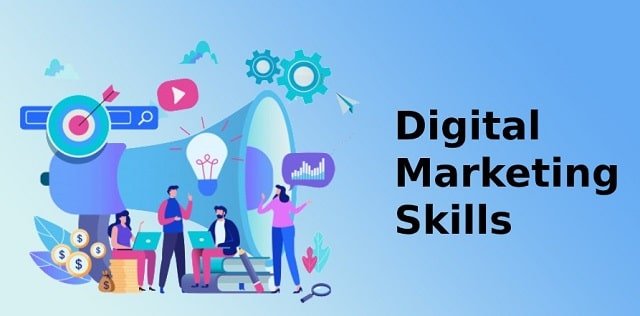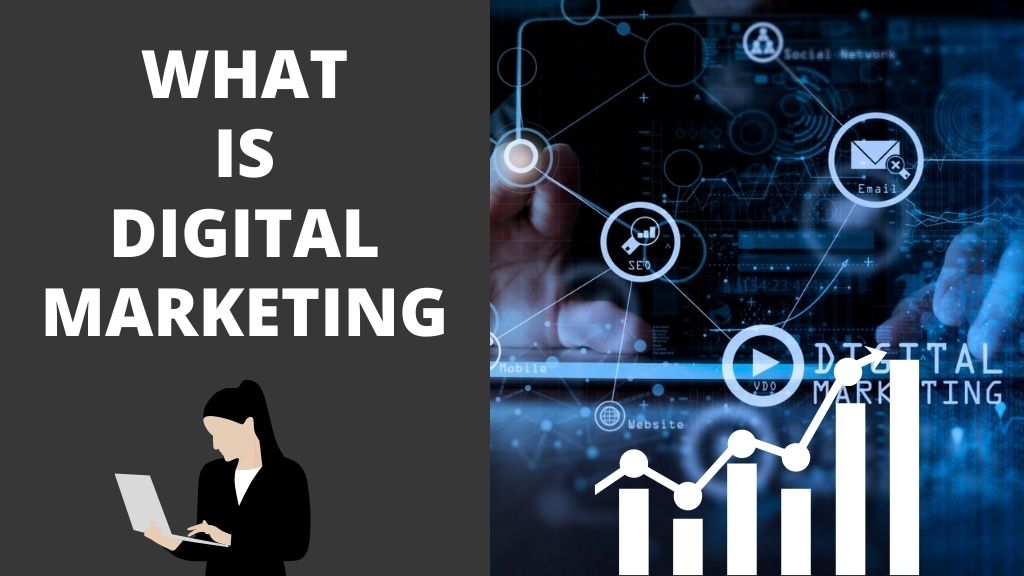Are you interested in learning more about digital marketing?
Do you want to know how it can help you grow your business or advance your career?
If yes, then you are in the right place. In this blog, I will explain what digital marketing is, what types of digital marketing exist, what skills you need to succeed in this field, and what careers you can pursue with digital marketing knowledge.
By the end of this blog, you will have a clear understanding of digital marketing and how to use it effectively.
What is digital marketing?
Digital marketing is a form of marketing that uses the internet and digital technologies, such as computers, mobile devices, social media, search engines, and other digital channels, to connect with customers.
Unlike traditional marketing, which relies on print, radio, or television, digital marketing allows you to reach customers wherever they spend the most time online.
Digital marketing also enables you to collect and analyze data, which helps you understand your customers better and tailor your marketing messages to their needs and preferences.
Digital marketing is not just about running ads on Facebook or Google.
It is a comprehensive strategy that involves creating and distributing valuable content, engaging with your audience, building relationships, and driving conversions. Digital marketing can help you achieve various goals, such as:
- Increasing brand awareness and recognition
- Generating leads and sales
- Building customer loyalty and retention
- Enhancing customer satisfaction and trust
- Improving your online reputation and authority
- Growing your market share and competitive advantage
Types of digital marketing
There are many types of digital marketing, each with its own benefits and challenges. Here are some of the most common and effective types of digital marketing that you should know:
- Search engine optimization (SEO): SEO is the process of improving the visibility and ranking of your website or web pages on search engines, such as Google or Bing.
SEO involves optimizing the content, keywords, links, and technical aspects of your website to match the search intent and preferences of your target audience.
SEO can help you drive organic (free) traffic to your website, which can result in more leads and sales. - Content marketing: Content marketing is the creation and distribution of relevant, valuable, and engaging content, such as blogs, articles, videos, podcasts, ebooks, infographics, etc., to attract and retain your target audience.
- Email marketing: Email marketing is using email to communicate with your customers and prospects.
Email marketing can help you deliver personalized and timely messages, such as newsletters, promotions, offers, reminders, etc., to your email list. - Pay-per-click (PPC) advertising: PPC advertising is a type of online advertising where you pay a fee every time someone clicks on your ad.
PPC advertising can help you reach a large and targeted audience quickly and effectively.
You can use PPC advertising on various platforms, such as Google Ads, Facebook Ads, Instagram Ads, etc., to drive traffic, leads, and sales to your website or landing page. - Social media marketing: Social media marketing is the use of social media platforms, such as Facebook, Twitter, Instagram, LinkedIn, etc., to connect with your audience, share your content, and promote your brand.
Skills for digital marketing

Digital marketing is a dynamic and competitive field that requires a diverse set of skills and competencies. Here are some of the essential skills that you need to succeed in digital marketing:
- Analytical skills: Digital marketing involves collecting and interpreting data to measure and improve your marketing performance.
You need to be able to use various tools and techniques, such as Google Analytics, Google Search Console, A/B testing, etc., to track and analyze your marketing metrics, such as traffic, conversions, bounce rate, etc. - Creative skills: Digital marketing requires you to create and deliver compelling and engaging content that resonates with your audience and motivates them to take action.
You need to be able to use your imagination and innovation to craft catchy headlines, captivating stories, appealing visuals, and persuasive calls to action. - Communication skills: Digital marketing involves communicating with your customers and prospects through various channels and media.
You need to be able to write clearly, concisely, and convincingly, using the appropriate tone, voice, and language for your target audience and purpose.
You also need to be able to listen actively, respond promptly, and interact effectively with your audience, as well as collaborate with your team and stakeholders. - Technical skills: Digital marketing requires you to use various tools and technologies to create, manage, and optimize your online presence and campaigns.
It’s necessary to be familiar with the basics of web design, development, and maintenance, such as WordPress, etc.
You also need to be proficient in using various software and platforms, such as SEO tools, email marketing tools, social media tools, etc.
You also need to be aware of the latest trends and developments in digital marketing, such as artificial intelligence, chatbots, voice search, etc.
Careers in digital marketing
Digital marketing is a fast-growing and lucrative field that offers many opportunities for career advancement and development. Here are some of the popular and rewarding careers that you can pursue with digital marketing knowledge:
- Digital marketing manager: A digital marketing manager is responsible for planning, implementing, and overseeing the overall digital marketing strategy and campaigns of an organization.
A digital marketing manager works with various teams and departments, such as content, SEO, PPC, social media, email, etc., to ensure that the digital marketing goals and objectives are met. - SEO specialist: An SEO specialist is responsible for improving the visibility and ranking of a website or web pages on search engines.
An SEO specialist conducts keyword research, optimizes the content and technical aspects of the website, builds and maintains links, and stays updated on the latest SEO trends and best practices. - Content marketer: A content marketer is responsible for creating and distributing relevant, valuable, and engaging content to attract and retain the target audience.
A content marketer researches the audience’s needs, interests, and pain points, and develops a content strategy and calendar. - Email marketer: An email marketer is responsible for using email to communicate with customers and prospects.
An email marketer builds and segments the email list, designs and writes the email copy, tests and optimizes the email campaigns, and sends and tracks the email messages.
An email marketer also analyzes the email metrics, such as open rate, click-through rate, conversion rate, etc., and provides reports and recommendations for improvement. - PPC specialist: A PPC specialist is responsible for managing and optimizing the online advertising campaigns of an organization.
A PPC specialist conducts keyword research, creates and launches the ads, sets and manages the budget and bids, and monitors and adjusts the ad performance.
A PPC specialist also analyzes the PPC metrics, such as impressions, clicks, conversions, cost per click, etc., and provides reports and suggestions for improvement. - Social media manager: A social media manager is responsible for managing and growing the social media presence and reputation of an organization.
A social media manager creates and executes the social media strategy and plan, creates and posts the social media content, engages with the audience, and builds and maintains relationships.
Digital marketing is a form of marketing that uses the internet and digital technologies to connect with customers.
Social media marketing has many types, such as SEO, content marketing, email marketing, PPC advertising, and social media marketing.
Digital marketing also requires many skills, such as analytical, creative, communication, and technical skills.
Digital marketing also offers many careers, such as digital marketing manager, SEO specialist, content marketer, email marketer, PPC specialist, and social media manager.
If you want to learn more about digital marketing and how to master it, you can enroll in one of the many online courses and programs available on the internet.
For example, you can check out the Digital Marketing & E-commerce Professional Certificate from Inflowdeck Academy, which will teach you the fundamentals and best practices of digital marketing and e-commerce.
You can also check out the Digital Marketing Career Track from Diston Institute, which will help you become a job-ready digital marketer with hands-on projects and mentorship.
